Photo
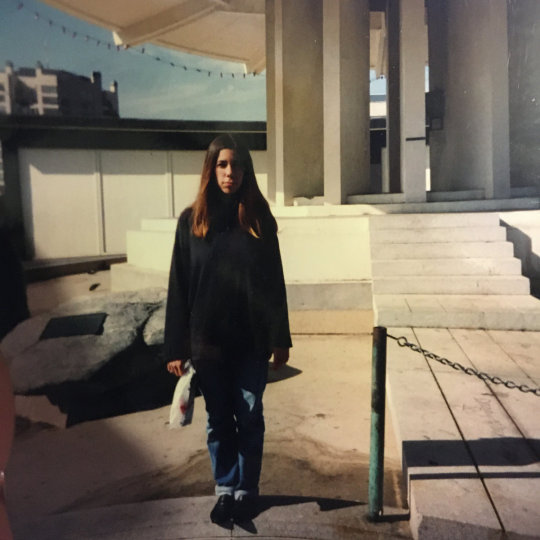
Brown Butterfly b/w Hoedown by Harry Pussy
"The beginning & the end. "Brown Butterfly" was recorded at Churchill's at one of our earliest live shows, guessing in 1992, then released on the "Music Generated By Geographical Seclusion And Beer" compilation CD the following year. "Hoedown" (not much of a title, but that's what was on the cassette tape) was recorded by me right after our last tour, my fingers still moving from six weeks of nightly shows, but nowhere to go."
0 notes
Photo
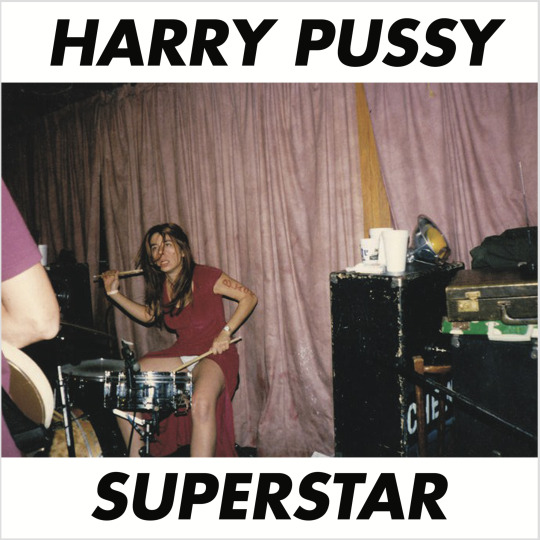
Superstar by Harry Pussy
Somewhere between the first and second Harry Pussy singles, Adris and I worked up a set's worth of 30-second 'songs.' I doubt we ever played the whole thing live, but we did record it over a couple of nights at Rat's studio around the corner from our Michigan Ave apartment on Miami Beach. Our occasional bandmate, Ian Steinberg, a teenage accordionist whose mom dropped him off for the session, showed up on the second night to contribute vocals and fuzz accordion on several tracks. Of all the songs recorded, only 'HP Superstar' was ever released, on 1995's 'What Was Music?' compilation, though 'No Hey', 'Youth Problem' and 'Prelude' appeared in other versions elsewhere. Live renditions of some of this set are also captured on the 'Live in Chapel Hill, 1993' single.
0 notes
Photo

You'll Never Play This Town Again by Harry Pussy
Compilation of recordings from the final trio version of the band.
All high energy music tends towards the omega point that would see it escape form altogether, where the jam is the thing and the song a mere excuse for getting there. Even hardcore, the most doctrinaire of rebel musics, planted the seeds of its own overthrow in its urge-to-accelerate, with each successive wave of groups battling the last in terms of speed of execution, of hyper-exaggerated moves, in order to be the ones that even time couldn’t hold back. Where psychedelia was all about leaving your body behind, hardcore posited a muscular oblivion by way of a punishing physicality, one that went hand-in-hand with a puritanical aesthetic, a skinhead form of scourging to ecstasy. Harry Pussy were the most extreme hardcore group of the post-punk era. They were hyper everything, hyper-fast, hyper-crude, hyper-free, hyper-dexterous, hyper a-musical. They boasted a once-ina-lifetime line-up, straight out of Miami: Bill Orcutt on electric guitar, a weird film maker and prodigiously talented instrumentalist; Adris Hoyos, first-time drummer and vocalist, a goofy tough-attitude chick from Cuba with a feral performance style; and Mark Feehan and Dan Hosker, two separate second guitarists, the presence of one or the other serving to define the group’s two distinct eras.
It’s the later Hosker-era that this new 42 track compilation of rare and unreleased recordings is drawn from. The main difference between the line-ups is that Harry Pussy actually got faster as they evolved, tracking the opposite trajectory of normal punk groups. When Feehan was playing with them they could still get strung out, still play more obviously ‘free’. But by the time of these recordings Harry Pussy were playing 60 second bursts of chaotic rock ’n’ roll that barbarise whole histories of freakout style, from free jazz through classic hardcore, boogie, blues, Black Flag, Germs, most explicitly through Beefheart, but all hyper-condensed into ultra-kranky riffs that Orcutt plays at hallucinatory speed, compressing Zoot Horn Rollo-style avant confusion into lighting runs and metallic two note knock-outs. Hoyos’s style is so primitive that it’s wildly avant garde, with an instinctive feel for time that confounds the most advanced improvisatory strategies with the most hysterical. And her vocals are post-Yoko in the truest sense, not directly informed by her but sharing the same spontaneous energy and a-musical appeal, sometimes breaking from songs completely to expand on barely articulated vocal rants and fever pitched bouts of screaming. During the Hosker period the whole group existed in a zone that was constantly beyond technique. You’ll Never Play This Town Again features some of the best Harry Pussy recordings, the Untitled/Tour/Fuck You LP, the live 10”, the split singles with Pelt and Frosty (what the hell happened to them?) and the Radiation Nation single on De Stijl alongside seven unreleased tracks, all expertly remastered. The May 1997 studio tracks are as formally staggering as anything on Trout Mask Replica. “Ice Cream Man” is “Dali’s Car” at four times the speed, just as “Smash The Mirror” is “Ella Guru”. The tracks are also cut in an extremely appealing audio-verite style. Hoyos is nasty, sarcastic, infectiously funny. Despite the improvised feel of most of the tracks, Harry Pussy were an ultra-tight performance unit and played actual songs, with out-takes and live versions sounding just as rigorously conceived as the originals. The live recordings are important both for successfully capturing the insane energy of the group and for including their legendary version of Kraftwerk’s “Showroom Dummies”, where Orcutt’s irresistible “Big Eyed Beans” groove and Hoyos’s mad vocals and drums create a reading that’s more pneumatic than motorik while spearing the very heart of the tune. It’s still one of the all-time great cover versions. Teenage Jesus And The Jerks are the group that Harry Pussy most often get compared to, but hearing them covering that group’s “Orphans” on a bonus live track (coincidentally the last track from their last live performance), it’s clear that Harry Pussy were of a much more rock/roll bent than any of the No Wave groups, making music that wasn’t so much a refusal of previous rock modes as an exaggerated celebration of all of its most outlaw attributes. Of the rest of the unreleased material the most interesting track is “Velvet Pussy”, a take on a Velvet Underground-style rocker that sounds uncannily like your dream VU bootleg. But it’s the officially released material that’s the real attraction, tracks like “Sex Problem”, “Smash The Mirror” and “Chuck!”, with Hoyos pulverising time and Orcutt out-stripping it completely. The closing extended take on “Smash The Mirror” is one of the great free jazz-inspired electric guitar freakouts, up there with The Byrds’ “Eight Miles High”, Television’s live reading of “Fire Engine”, The Blue Humans’ Clear To Higher Time and The Dead C’s Helen Said This. Harry Pussy formed in 1992 and imploded in 1997, played a bunch of legendarily riotous shows, got barred from a whole bunch more, released a string of amazing LPs and 7”s and then disappeared. Hoyos is currently married with two children, working in computers, living with musician and artist Graham Lambkin and seemingly retired from music. Rumours persist of Bill Orcutt making a return to the stage but outside of reports of a shady uncredited 7” nothing has been heard of him since. The arc of their career was perfect, the mission truly accomplished, and all that’s left is this amazing series of recordings, a body of work that has had a disproportionate effect on the minds, if rarely the actual sound of the underground.
David Keenan, the Wire
Dylan Nyoukis from a blindfold test in The Wire
Harry Pussy “Mandolin” From You’ll Never Play This Town Again (Load) 2008 Beefheart? No, it’s Harry Pussy, man. I should’ve known it straight away. This, to me, is what punk music should have been. I discovered punk music ten years after the fact and I think I was doubly disappointed. I imagine, if my life had been a different throw of the dice, I might have been a kid in 1980 or 1979 discovering punk and being so disappointed with how it sounded: so boring, so absolutely fucking objectionable pub rock. Terrible. I just leapfrogged that shit to Metal, which is in itself just goofball shit, and then into weirdo shit. And then I heard Harry Pussy. This is what I thought punk should sound like. It’s wild shit. It’s visceral. It’s about where you are at the moment. It’s about where your fucking stomach is, on the moment. Where is your belly positioned? Chocolate Monk released Harry Pussy quite early on. We released Vigilance, on a C120: two hours of jams, but I guess the recording mechanism was a bit goofed up so a gap keeps appearing. credits
Dan Hosker: guitar, Adris Hoyos: drums and vocals, Bill Orcutt: guitar and vocals. Blake Eden: drums on “New Song.” Robert Price: synthesizer on “Velvet Pussy” and “MS20.”
Everything by Hosker/Hoyos/Orcutt except “New Song” by Nip Drivers, “Showroom Dummies” by Kraftwerk and “Orphans” by Teenage Jesus and the Jerks.
Tracks 1-17 recorded January 1997 by the band at Anvil Rehearsal Studios, Miami, FL. Tracks 18-31 recorded 5/5/97 by Rat Bastard at Churchill’s Hideaway, Miami FL and mixed by Rat Bastard and Tom Smith. Track 32 recorded 4/16/97 at Salon Zwerge, Chicago IL by Emil Hagstrom. Tracks 33-42 recorded 5/4/97 and mixed by Tom Smith at Microgroove Studio, Atanta, GA.
Thanks to Rat, Tom, Emil, Graham Lambkin, Brently Pusser and Marc Weitz.
1 note
·
View note
Photo
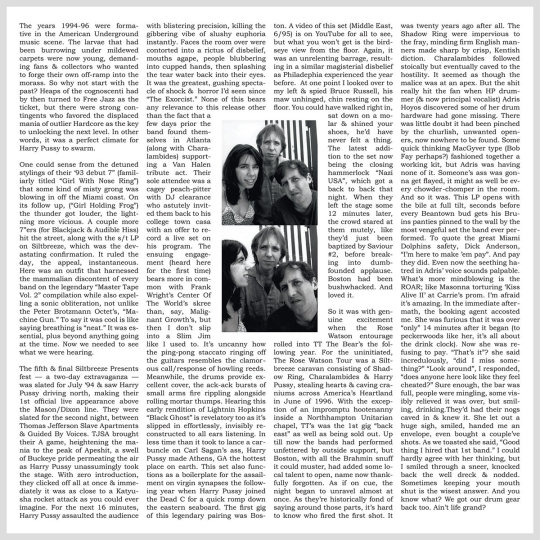
A Real New England Fuck Up by Harry Pussy
Unreleased mid-nineties live recordings of Harry Pussy in peak trio formation, with extensive eye-witness liner notes by Siltbreeze label-head Tom Lax & Tom Carter of Charlambides. Original LP in an edition of 500.
“The 1996 Shadow Ring / Harry Pussy / Charalambides ‘Rose Watson’ tour. ... There were two vans, three bands, two drivers. Tom Lax was at the helm, rationing the booze and blasting ‘Killed By Death’ Volume Whatever all through the Midwest. I walked out of a gig in Ypsilanti and tripped on a large dildo. Soundmen held their ears in Cleveland. We rolled out of Rochester (after Adris and my bandmate Jason blew an entire soundcheck screaming insults at each other in Spanish) and the soundman stuck his head in the car and yelled “don’t ever come back!” Byron Coley booked a show in Amherst with an audience of zero. Harry Pussy and Shadow Ring played, we didn’t, and everyone was hanging out afterwards in front of the Unitarian Church when the local bus pulled up. Its lone occupant stepped out, looked around, and asked ‘Is this where the Harry Pussy show is?’
The TT’s show, snipped from the end of this tour, was a shambolic near disaster. The fact that a recording survives at all is a minor miracle. We arrived to witness openers the Cotton Kings fleeing the venue after eating a bunch of acid, destroying the PA monitors, and swiping Adris’ cymbals, which one tripping, bathrobe-clad member slunk back to return later. ... Mr. Lax tried to calm me down by feeding me bourbon shots. We played. The PA was shot and we couldn’t hear each other. I hurled my guitar across the stage, poured my beer over my head, and threw a pair of slides into the crowd, narrowly missing Wayne Rogers. Harry Pussy took the stage and sandblasted the night into oblivion, while I hid in the van (Mac: ‘What the fuck is your problem?’) until I was sober enough to attempt to find the Greyhound station and catch the first bus back to Houston. Christina spotted me wandering off and forcibly dragged me back into the club.” Tom Carter
Bill Orcutt: guitar, vocals
Adris Hoyos: drums, vocals
Mark Feehan: guitar
0 notes
Photo
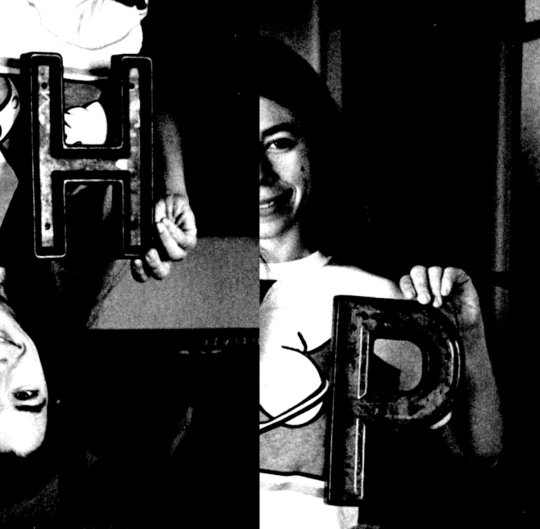
One Plus One by Harry Pussy
Compilation of early duo era recordings
Lightning Bolt, blindfold test in the Wire
Harry Pussy “Vigilance” From One Plus One (Palilalia) 2012, rec 1992 BG: Harry Pussy! BC: Yeah, the Harry Pussy guitar. It’s so distinctive. [Points to Bill Orcutt solo LP on the floor] This band is huge. BG: They’re the best. BC: We used to have a warehouse, and they came and played there in the late 90s. They were a sick trio. BG: Yeah, they played Fort Thunder. BC: There was a huge spaghetti fight, back when I would have been psyched to be in a spaghetti fight. This is from when they were still a duo. The duo is a very potent format. BC: It’s a natural state. People pair up historically. The idea of bands is weird, how do all these people get on the same page? When you’re watching a four person band, you’re like, who’s in charge? When you’re a two person band, you can both be in charge and get away with it. There’s almost an arrogance to it, at least with us. We can go pretty full on. There’s no restraint necessary. BG: We have our own domains. BC: There’s your territory, here’s mine. BG: At a show, you’ve got all the people looking at you… BC: And you’ve got all the girls standing next to you. BG: You can be the performer and I feel like I can just screw around in my own way. BC: We’re a little like Laurel and Hardy. People think of Harry Pussy as this wild, chaotic band, but this is almost sad, melancholic. Do you use any emotional cues? Do you ever say we’re going to do a happy song today? BC: I feel like once a year before practice we suggest something. It never dawns on us, and every once in a while it works as an exercise. We’ll suggest a mood and it works as inspiration. For a minute. BG: Often we’ve had the experience of talking for two hours about our aspirations for what the next record or next song is going to sound like. Then we start playing and it all goes out the window. You can’t control Lightning Bolt. We have to discover what’s working when we’re doing it. We can’t go home and figure that out. We have to be playing together. If you can’t control Lightning Bolt, it means you live up to your own name. BC: Our brains are not in charge of the situation. BG: The Harry Pussy stuff, to me it’s not sad. It’s expansive. It’s like John Coltrane, when you get so expansive and loose and lucid when you’re playing that it feels free and liberating. I get that feeling from Harry Pussy. I’m not sure if that’s what they’re going for. BC: The biggest difference with this one is the playing of Adris [Hoyos]. It’s chilled out. Even some of the later Harry Pussy stuff, if you take the guitar out, some of those notes are sad. It’s super sharp and angular and scattered and shattered, but then there’ll be these sad notes in there… [Adris] was an idol. A wild person, musically at least. BG: It’s magic. The appearance of her playing, her hair and her gestures. BC: A real tornado. It feels like you could put her in a room full of coloured pencils and achieve a similar effect. She just applies herself in a ferocious way to the tools.
Drums – Adris Hoyos
Guitar – Bill Orcutt
0 notes
Photo
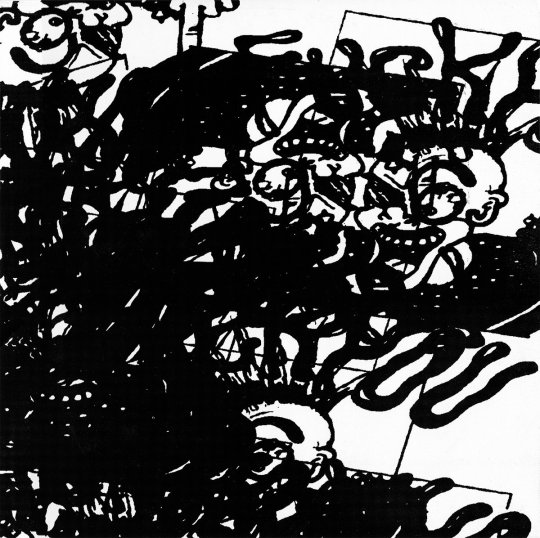
Untitled by Harry Pussy
The third Harry Pussy LP originally released in 1997 by the band to sell on tour. Dylan Nyoukis from a blindfold test in The Wire Harry Pussy “Mandolin” From You’ll Never Play This Town Again (Load) 2008 Beefheart? No, it’s Harry Pussy, man. I should’ve known it straight away. This, to me, is what punk music should have been. I discovered punk music ten years after the fact and I think I was doubly disappointed. I imagine, if my life had been a different throw of the dice, I might have been a kid in 1980 or 1979 discovering punk and being so disappointed with how it sounded: so boring, so absolutely fucking objectionable pub rock. Terrible. I just leapfrogged that shit to Metal, which is in itself just goofball shit, and then into weirdo shit. And then I heard Harry Pussy. This is what I thought punk should sound like. It’s wild shit. It’s visceral. It’s about where you are at the moment. It’s about where your fucking stomach is, on the moment. Where is your belly positioned? Chocolate Monk released Harry Pussy quite early on. We released Vigilance, on a C120: two hours of jams, but I guess the recording mechanism was a bit goofed up so a gap keeps appearing. Adris Hoyos: Drums, Voice Bill Orcutt: Guitar Dan Hosker: Guitar Blake Eden: Drums on "New Song"
0 notes
Photo
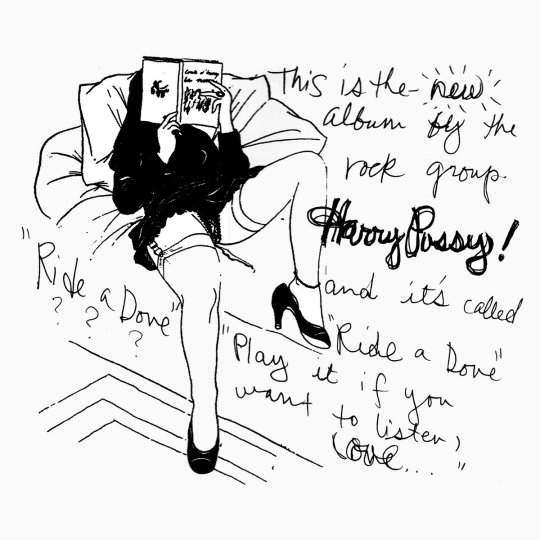
Ride A Dove by Harry Pussy
Reissue of the second Harry Pussy LP, "Ride A Dove", originally released on Siltbreeze in 1996. "By 1996, with one LP, a handful of 7"s, and a couple dozen gigs under their collective belts, Harry Pussy had thoroughly scrambled the mid-90s scuzz-rock ecosystem. Their acclaimed first LP, described by David Keenan as 'a black hole that devoured genre and flattened any attempt to classify it,' fused Japanese noise, '80s hardcore and post-Ayler jazz into a dense, white-hot ball of punk anger and insanity. The band's newly expanded trio lineup of Bill Orcutt, Adris Hoyos and Mark Feehan toured with Dead C, Sebadoh, and Sonic Youth. Thurston played their video on MTV's 120 Minutes. Nirvana gave them shout outs. Everyone expected the sophomore Harry Pussy LP would be more of the same, a logical next step, a synapse-melting punk orgasm that would shatter the coke-bottle spectacles of noise stoners, record store clerks, and college radio DJs across the USA. Instead, we got Ride A Dove: a 30-minute, tempo-less, musique concrète collage of feedback, whiny Sonic Youth fans, overdriven room tone, hijacked jungle beats, unhinged screaming, and the near-constant squall of the self-oscillating low-pass filter on Orcutt's Korg MS-20. Recorded on Sony Walkman and Tascam Portastudio, mixed through a RAT distortion pedal, then chopped and scrambled with SoundEdit 16, it took to new heights the Siltbreeze tradition of terrorizing mastering engineers by burying everything with shitty post-production (cf. Jim Shepard's Radio Shack reverb on his Picking Through the Wreckage With a Stick LP). Thanks to the single unbanded groove on each side (and similarly unindexed CD), the relationship of Ride A Dove's 'songs' to its listed song titles -- which allude to Michael Jackson, the Bee Gees, and most of all, Black Flag, whose 'Rise Above' is echoed by the malaprop of the album title -- was decidedly obscure. One might be forgiven for characterizing this career anti-move as a simple challenge, an 'ok, sell THIS' to an unsuspecting distributor -- Matador Records, who surely had no idea what they were getting into when they scooped up Siltbreeze for a manufacturing and distribution deal -- or to fans naively anticipating simple catharsis. Rather, Ride A Dove is an intensely personal document of a disintegrating marriage and band; a snapshot of an era when noise groups were unexpectedly emerging from complete darkness into mere shadow; a diary of questionable decisions regarding marital fidelity and drug consumption. It's a raw, vulnerable record that is more Rumours (1977) than Metal Machine Music (1975). In the aftermath of Ride A Dove, and the near-apocalyptic Harry Pussy/Shadow Ring/Charalambides tour that followed it, life went on. Bill and Adris split up, guitarist Mark Feehan decamped, and Harry Pussy soldiered on for a few more records, including the sleeper double LP Let's Build a Pussy (EMEGO 146LP), which perhaps stands closer to Ride A Dove's high-register wail and conceptual monomania than any other of the band's recordings. As for Ride A Dove itself, the intervening decades has made it almost fashionable, yet harshly adorned in a raggedness that's as cozy as a fiberglass sweater." --Tom Carter Christina Carter from a blindfold test in The Wire Harry Pussy “I Started A Band” From Ride A Dove (Siltbreeze) 1996 [After crowd noises at beginning] Oh! It’s Harry Pussy! I don’t know what era this is from. 1996, from Ride A Dove. I haven’t heard this since... 96? The year it came out. Charalambides toured with them... I think the controversy has been settled. I felt it was a controversy because... make no mistake, it was chaos at times, from the audience’s perspective. However, I always knew it was a lie that [Harry Pussy] didn’t know or couldn’t control what was going on. There was one tour we went on where it was pretty out of control, but I felt that people didn’t realise it was chaos because they were pushing it towards that, or allowing it to happen; they had the ability to rein it in. Things were technically precise, they were executing complex pieces. [Guitarist] Bill Orcutt will say I’m a nerd for saying it like that [laughs]. One thing that has been great in the recent past is seeing him play and getting to spend a little time with him again. I think they’re amazing musicians, especially Adris [Hoyos, drummer], and that used to tick me off, the attitude of some people that she’s just randomly playing. It’s complicated when you get into technical ability, emotion, intent, but this is not random. This is organised, conscious music that had the ability to create a type of chaos, but also, if you could understand, because it was repeated night to night, a type of restraint and focus. It was one of the most amazing experiences I’ve had because I was able to see them over and over. That’s an important part of touring for me, and touring with another band, to see how different people deal with these conditions, having to be up there in front of people night after night, how they handle that, what they bring to it. How they deal with being in the centre of whatever type of vortex it is. Touring with them was really fun, too. Do you think you have a handle on touring now? No, I haven’t had the chance to do an actual extended tour for a very long time. I think I got fairly good at dealing with the boredom, the routine. How do you keep yourself interested and excited night after night? You don’t. I don’t believe in building false excitement or interest. It would naturally come. You’re in a new place, you’re playing for new people. And hopefully there is an atmosphere established by the people putting on the show. I never went on tour where I played the same thing every night. If I was playing the same group of songs, I always had more than I would play in any one night. I never played them in the same way, often in radically different ways. And often I would make things up on the spot as well, putting myself into a precarious position. And that’s the exciting part, to see what’s going to come out of that. And sometimes failure is just as interesting, especially when you feel you’ve failed and other people disagree. credits Adris Hoyos - drums, vocals. Bill Orcutt - guitar, vocals. Mark Feehan - guitar.
0 notes
Photo
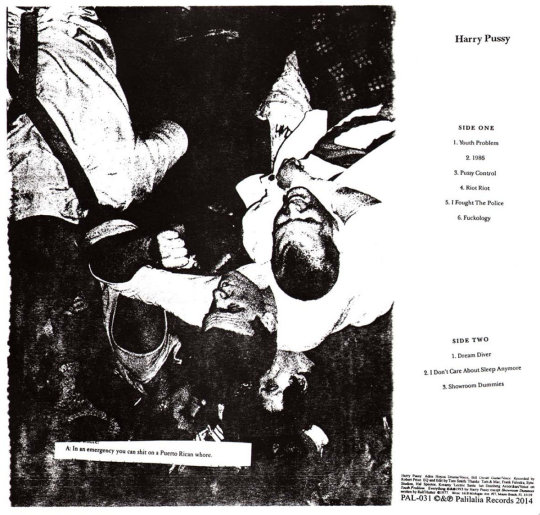
Harry Pussy by Harry Pussy
The first Harry Pussy LP originally released in 1993 by Siltbreeze records.
The first Harry Pussy LP originally released in 1993 by Siltbreeze records. "The velocity with which Harry Pussy announced themselves on their debut self-titled LP may have led to a whole bunch of clubs closing their doors to them, or at least vowing never to have them back, but it also facilitated their induction into a bunch of seemingly disparate genres. They were a noise band, right? A hard- core band. A punk group. A free jazz duo. As with any encounter with a singularity, matter is crushed to in nite density and the pull of gravity is infinitely strong, which is another way of saying that the first Harry Pussy album was a black hole that devoured genre and that flattened any attempt to classify it. Drummer and vocalist Adris Hoyos was the engine of the group, the presence on the edge of the event horizon, with a style that collapsed in on itself again and again and that made for some of the most formally inventive structural imperatives ever detonated in the heart of a power duo. Listen to “1986”. It sounds like it is being played backwards in real time. Comparisons to drummers like Sunny Murray were helpful, in terms of establishing some kind of stable co-ordinates with which to make sense of Hoyos’s involution of time and the role of the drummer, but ultimately functioned as a dead end. Likewise the idea that Harry Pussy were a noise group. Okay, so it was the best we had at the time but a term like noise would seem to suggest that Harry Pussy were working outside of the vectors of what music would allow, outside of the strictures of song and if a band were ever strict — tight, even — then it was Harry Pussy, whose live shows — listen to them — saw them recreate the ‘studio’ recordings down to the last snapped string. “Alright, let’s play a song,” guitarist Bill Orcutt says at one point, as if to remind us. Orcutt rejects the concept of extended technique when applied to what he did in Harry Pussy but the point is that they played at such a heightened speed-of-thought climactic future-primitive peak that they outstripped technique so completely that people thought they couldn’t actually play at all and so dubbed them a ‘noise’ band. And if that doesn’t make the form extended it at least makes it circular. And what a sound; has the electric guitar ever sounded better? Those amazing, explosive sections on “Fuckology”; high tension blues, barbed wire sonorities, tactile, taut, everything metal and punk and noise seemed to hint at the first time you ever heard about it. I still wish “Fuckology” didn’t fade out but Harry Pussy’s music is truncated in time while extensive in density, in its ability to turn itself inside out, in a second, forever. The tonal centre is a black hole and the whole of the second side plays out exactly like that, like an extended singularity, and it is one of the most perfect sides of vinyl ever rendered. “Dream Diver” is Suicide’s “Frankie Teardrop” played as desperate man blues in its hysterical emotional flatlining, in its desolation, “I Don’t Care About Sleep Anymore” is a masterpiece; elegiac, staggering, genuinely beautiful, with Orcutt just weeping and bleeding all over the track. The duo’s inspired electro-convulsive take on Kraftwerk’s “Showroom Dummies” is the greatest cover version this side of Hüsker Dü’s evisceration and implied extension of The Byrds’ “Eight Miles High”. Maybe The Magic Band came close, at points, to this kind of, well, magic, but for Harry Pussy the Trout Mask House was on the road, every night a trial by fire, a live action formulation of the new music. The bathetic nature of some of the between song dialogue works to assure us that this music was created in real time, by actual humans, with their bare hands. Listened to now I hear a weird pianistic aspect to Orcutt’s playing, an echo of Glenn Gould that he would go on to more fully explore via the obsessive tics of his solo music; you can hear it in the tightly held clusters, the bass insistent while the other hand elegises, inverting the piano so the right hand holds it down while the left hand ips. This is the piano as tempered drums via the guitar as suspended steel tempered by electricity. Sure, I’ve dubbed them a hardcore band in my time, a noise group, a punk jazz outfit, but none of them ever fit. Truly, Harry Pussy were a black fucking hole. So set it spinning." David Keenan Glasgow, Scotland May 2015
Drums, Voice – Adris Hoyos
Guitar, Voice – Bill Orcutt
Liner Notes – David Keenan
Recorded By – Robert Price
Technician [Eq And Edit] – Tom Smith
Ian Steinberg: Accordian/Voice on "Youth Problem"
0 notes